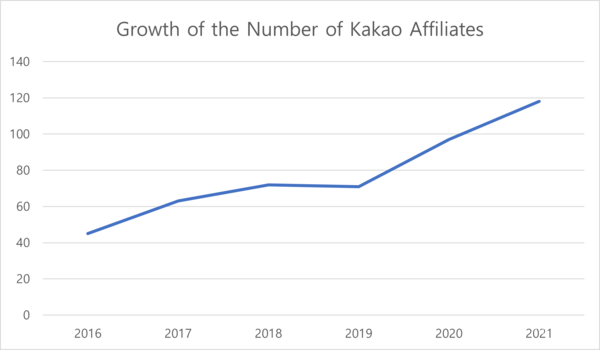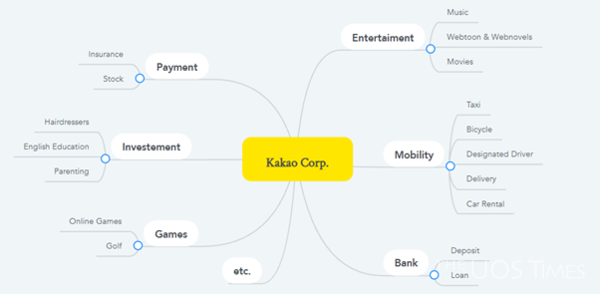Recently, the platform economy has been activated worldwide due to COVID-19, which has encouraged people to prefer internet activities, such as online shopping and online meetings, to avoid face-to-face contact. Therefore, powerful platform companies throughout the world have begun to expand their businesses.
The Kakao Corporation has been criticized in South Korea for its massive monopolistic business structure. Kakao is an enterprise that made a name for itself with its messenger application Kakao Talk, and has since extended its reach and influence into other areas. Many tradespeople and small business owners are enraged by its selfishness and detrimental impact on the economy. In addition, new terms such as “being Kakaoed” and the “Republic of Kakao” are coined to denote the monopoly of Kakao Corporation. Kakao maintains that it has been trying to develop innovative technology only for the convenience of consumers. However, businesses that have been affected by Kakao dispute this claim. They assert that Kakao Corporation’s innovation is nothing more than the egoistic plundering of entrepreneurs.
Worldwide Monopoly Problems
Globally, the rise of major platform companies is accelerating. Their rapid growth has been spurred by their active mergers and acquisitions (M&A) processes. Major corporations target small companies that are trying to survive the pandemic and acquire them to grow even bigger. According to a March 2021 report by the International Monetary Fund (IMF), the market share of the four major companies (Google, Apple, Facebook, and Amazon) reached 60 percent following the spread of the disease, which is assumed to be about 56 percent in the absence of the pandemic.
Monopoly of Kakao Corporation
The Kakao Corporation has a vast number of affiliates in diverse categories. The company has expanded easily for two reasons. First, it has utilized the strategy of “conglomerate concentration,” which entails the merger of companies that are neither horizontally nor vertically related. Similarly, if the types of business are unrelated, it is easier to pass the examination of the Korea Fair Trade Commission (KFTC), which Kakao Corporation has abused. Therefore, Kakao, which began as a social media platform, has now expanded into other fields, such as transportation, entertainment, and education. Moreover, many smaller companies and vulnerable businessmen exhausted by the pandemic have relied on Kakao Corporation since it is one of the easiest ways to draw consumers. This popularity is because the majority of people are familiar with Kakao and feel confident in using its services. In these ways, Kakao’s affiliate network has grown by 162 percent in five years. Kakao Corporation had only 45 affiliates in 2016, but today it has more than 100 affiliates.

Nevertheless, a few issues have arisen consequent to the large company’s dictatorial approach toward small businesses. For example, Kakao charges taxi drivers a fee to use their “Kakao T” application, which connects taxi drivers and passengers. However, the company continues to hike the fee gradually, and taxi drivers are powerless to resist. Even though it is unfair, they are obligated to comply with Kakao’s terms because they cannot currently make much profit without the corporation’s help. Similarly, rather than improving its various services, Kakao has been focusing on increasing its market dominance. Continuously introducing paid content services and imposing the rates charged to tradespeople incur criticism. The picture below depicts Kakao’s reckless diversification.

According to Jang Yoo-jin, the president of the Korea Service Driver Society (KSDS), Kakao has been plundering the domestic market rather than the global market. In contrast to Kakao Corporation, NAVER, another major Korean platform company, targeted the global market more. In addition, NAVER has introduced the “Start Zero Fees” service to its small business partners in an effort to reduce the burden on businessmen. It supports start-ups by covering all costs for the first 12 months. Compared to NAVER, which strives to cooperate with entrepreneurs, Kakao has come under fire for its greed. On September 13, Realmeter, one of the most well-known Korean companies that conduct public opinion polls, announced the result of a public survey of 500 Koreans. The results indicated that 51 percent of the respondents agreed that the government should regulate big tech companies such as Kakao Corporation. Kakao has now expanded to include a financial platform, but it is exempt from the financial industry’s regulation as its asset size is below the industry norm. Thus, consumers who use Kakao financial services are vulnerable to unfair transactions and are not protected by the law. Consequently, those who discovered the risk and the damage caused by Kakao Corporation have been pushing for government regulations to end the company’s monopoly.
Policy Responses to the Problem
The South Korean government has begun to regulate major platform companies by reinforcing these laws. The KFTC reported that it is working on broadening the scope of assessment and supplementing overall systems. Beginning at the end of this year, the examination will take into account not only the size of the company but also the volume of transactions. Guidelines for the unilateral conduct of online platforms are also being drafted for legislation.
In addition, KFTC is on the move to enact the “Fair Online Platform Intermediary Transactions Act,” which would impose an obligation to provide a written contract containing the key contract terms and an obligation to notify the traders (or sellers) at least 15 days in advance of any change in the contract. When the platform intends to cancel the contract with its partners for valid reasons, it must give a minimum of 30-day notice. This act imposes a fine of up to 100,000,000 KRW on companies that violate the law and engage in unfair trade.
In order to regulate the financial businesses of giant platform companies, South Korea’s Financial Services Commission (FSC) has also provided a new command to the companies. To circumvent this regulation, Kakao has asserted that its role in the service is limited to “advertisement,” not intermediation. However, if Kakao does not reorganize its service in a way that does not violate the Financial Consumer Protection Act, it will be withdrawn by the FSC by force.
In addition to South Korea, the United States has begun to enforce strict regulations on major corporations. The U.S. intensified the M&A screening criterion by requiring platform companies to demonstrate that they are not in the process of expanding their market dominance. Moreover, the government has mandated that companies maintain a separation between the sale of their private brand (PB) and the management of their platform. Data portability and compatibility are also required to enable consumers to transfer their data to other services effortlessly.
Conclusion
Government intervention is necessary to end the tyranny of major platform companies worldwide amid the COVID-19 pandemic. Nations must end monopolization in order to establish a fair market order, thereby helping the weak in their fight against the powerful. More robust policies and regulations that regulate monopolies are the key to prevent further damage to small businesses and consumers.
Platform services such as Kakao provide users with conveniences, such as ease of payment, a known brand value that lends credibility, and easy accessibility, to name a few. However, this advantage does not mean that avoiding the use of platform services is completely inconvenient. Not only the government but also the citizens should pay attention to the problem and promote fair competition in the market. A little consumer attention, such as hailing a cab on their own rather than using applications that charge taxi drivers a large amount of fees, would be extremely helpful to small business owners.

